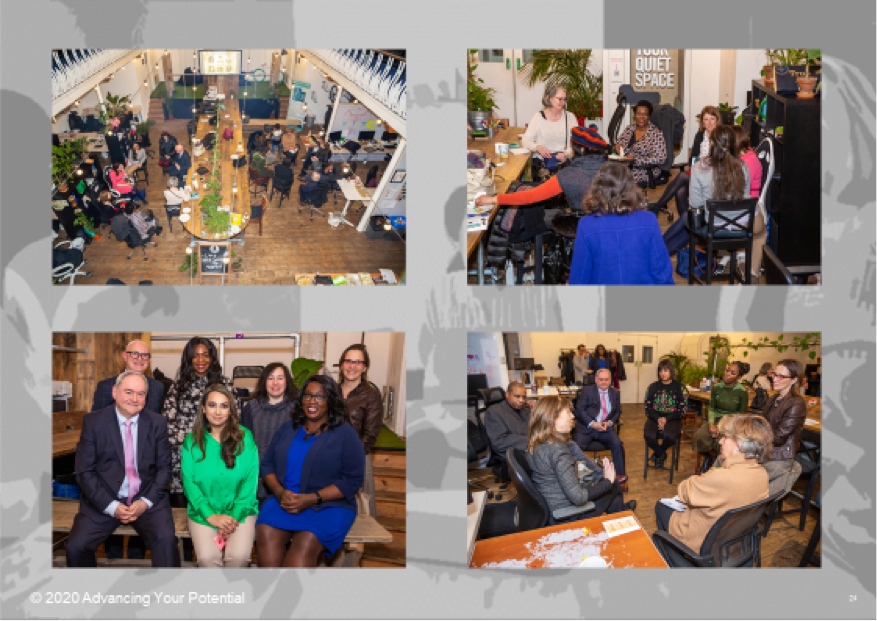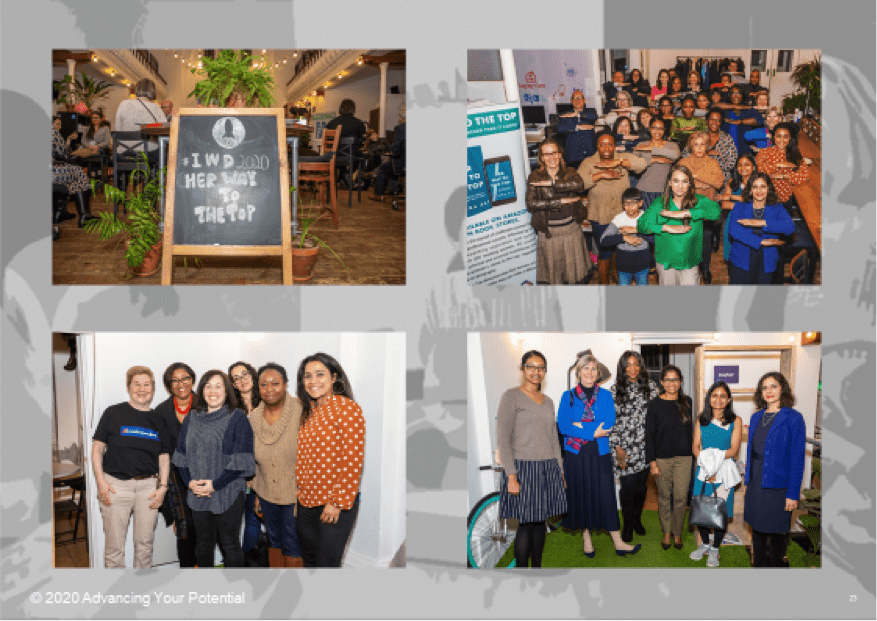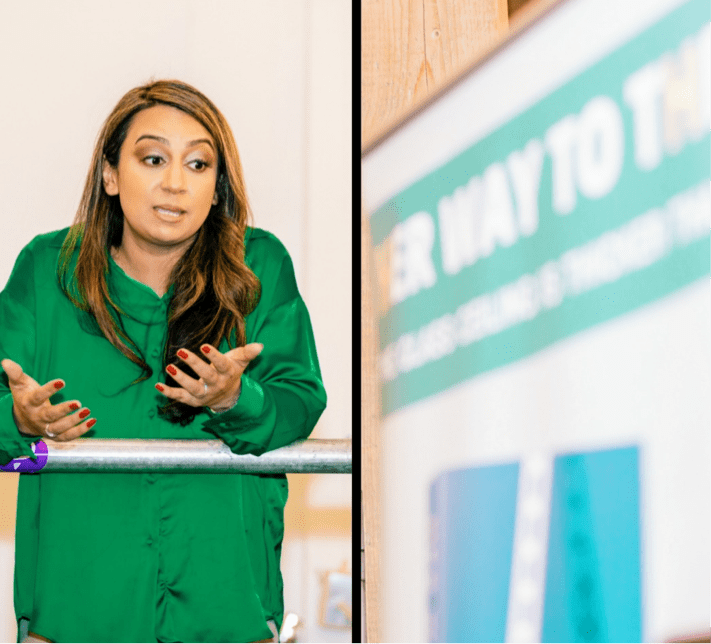On 4th March 2020, in celebration of the book anniversary of Her Way to the Top: A guide to smashing the glass ceiling and International Women’s Day, an event was held at King’s Cross London. The event was powered by Launch 22. The event was kick-started by a welcome note by lead moderator Cherron Inko -Tariah MBE followed by a live poll on the “Factors Most Impacting a Woman’s Climb To The Top”.
Altogether 44 participants contributed in this poll and the results are very similar to what we have seen in the global survey conducted in 2018, however this time the external challenges were given equal weightage too.
After conducting the poll, Hira Ali talked about her book journey and the way forward. She also talked about the various projects and ventures she is involved in including Advancing Your Potential, Career Excel, International Women Empowerment Events, and The Grey Area.
Following her talk, there were four facilitated and interactive focus group discussions moderated by industry leaders on the Roles of Government Legislation & Policies, Media, Organisations and Male Allies in smashing the glass ceiling.
The Role of Organisations in Breaking the Glass Ceiling
This focus group discussion was led by Barry Boffy
To summarise this discussion, it’s important to remember that all organizations are made up of individuals with their own beliefs, values, and priorities which will in turn influence organizational beliefs, values and priorities. In order to affect real change, you have to appeal to the individuals within an organization who have the ability to make that change.
It’s really important to understand that this attempt to change the hearts and minds of those within an organization must be done before any attempt is made to write or implement policy or practice that is designed to remove barriers, support development or progression or increase equality of opportunity for women.
The discussion was finished off with thoughts on what the group believed was the one thing that could really influence change in any organization: the ability to see role models. Role models in any organization really help to set the tone for what is seen as being acceptable and ultimately who is welcome and included. To have a woman in a visible senior position is a strong signal that women can progress within that organization and that this is no barrier to success.
The Role of Male Allies in Breaking the Glass Ceiling.
This focus group discussion was led by Anne-Marie Headley.
The question asked at the start was: To what extent do men play a role in promoting gender equality?
Feedback received indicated that male allies should provide the same support as a sponsor but in a more informal way. It was even asked if an ally needs to be male? The group thought that this was not necessary but the majority of leaders are male and we are trying to shift their mindset. Concerns were around the majority of leaders/decision-makers at work being male and the potential for them to solely look for successors who they have familiarity /affinity bias. Lastly, men should commit to improving their own self-awareness so they can be a catalyst for change and role models that they expect to see in others.
The Role of Media in Breaking the Glass Ceiling.
This focus group discussion was led by Emma Ko.
This group agreed that a better representation of women and BAME people was needed across all media. Around the world, women are far less likely than men to be seen in the media. As subjects of stories, women only appear in a quarter of television, radio, and print news. In a 2015 report, women made up a mere 19% of experts featured in news stories and 37% of reporters telling stories globally. A gender-imbalanced picture of society can reinforce and perpetuate harmful gender stereotypes and further exacerbate women’s under-representation in the workplace.
It was highlighted that diversity and inclusion officers need to have actual power otherwise they simply tick box roles. The group questioned: Do they have the actual power to exercise influence and address the imbalance? Do they have a seat at the table?. It is also important for women to have to advocate and promote other women, pay it forward, forge powerful collaborations, promote each other and encourage each other.
The Role of Government Legislation & Policies in Breaking the Glass Ceiling.
This focus group discussion was facilitated by Coleen Andrews and Neville Gaunt.
There was strong agreement in this group that laws should be made by people that are representative of their community and the general population (gender, race, etc). It was discussed that Gender pay gap provided transparency on the problem but there may be issues of “fatigue” already set in there was a desire expressed for more quotas - this has increased representation on boards, however, executive management teams haven’t changed in the same amount (without quotas).
The group also talked about the employment bill in queen’s speech to be put into legislation which will make flexible working a right for everyone
Neville was of the opinion that we need to start earlier with the youngest generation and formalize an education program of cultural engagement, diversity, and inclusion. “How to be a friend” maybe ... make it a curriculum subject rather than assume it happens.
Better representation of the school and university governing bodies can be achieved by including a Diversity Governor like an HSE Governor. The HSE's purpose is to make any legislation or involvement by the government to have a clear purpose.
Finally, Hira Ali added how important responsible storytelling is. We must counter the influence media has on portraying the ideal body image. These days, young girls are increasingly concerned about how they look and how much they weigh. The media needs to stop sexualizing and self-objectification. The role of sexuality majorly impacts self-construction. Sexuality discourses on social media are shaping women’s experience with technology, their perceptions of themselves, and ultimately, their educational and career choices and goals.
Author, Executive Career Coach, Leadership Trainer, Motivational Speaker,
Podcaster, & NLP Practitioner
Chief Executive Officer Advancing Your Potential
Founding Director of The Career Excel For Trailblazing Women
Managing Partner International Women Empowerment Events
Co-Founder The Grey Area
Email: hira@advancingyourpotential.com;
Follow me on Twitter, LinkedIn, Insta or Facebook
Get my Book Her Way To The Top
Read my article on Impostor Syndrome shared by Arianna Huffington
* Recipient Of Lift Effects Award for Top 100 Women, Finalist for Entrepreneur Of The Year- Batons Awards & Winner of Highly Recommend Woman in Media-Wintrade Awards






